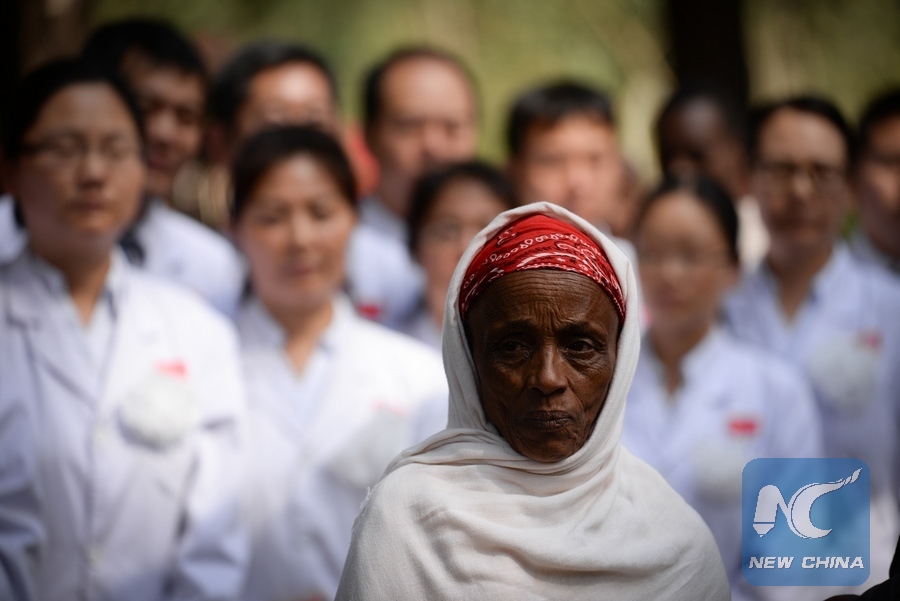
File photo shows Chinese diplomats, members of the Chinese medical team and Ethiopian villagers attend a commemoration ceremony at the tomb of Mei Gengnian in Jimma, April 4, 2016. (Xinhua/Michael Tewelde)
ADDIS ABABA, April 7 (Xinhua) -- Zewdie Haile, a villager in Ethiopia's Jimma town, is one of the voluntary "guarders" of a Chinese doctor's tomb.
The tomb belongs to Mei Gengnian, who led the first Chinese medical team to Ethiopia in 1974 before he was killed in a car accident in 1975.
Over 40 years later, Mei is still fondly remembered locally, not only for his selfless service, but for his legacy that has kept bringing Chinese goodwill to the East African country.
Marking China's Qingming Festival or Tomb Sweeping Day, the Chinese Embassy in Ethiopia on Thursday inaugurated a road in Jimma constructed with the aid of the Chinese government, and named it after Doctor Mei.
In his inaugural remarks on the road built by the Chinese company China Communications Construction (CCCC), Tan Jian, Chinese Ambassador to Ethiopia, said Ethiopia and China have carried out many cooperation in various fields, including on road infrastructure.
Inspired by the legacy of Doctor Mei, the Chinese would further strengthen cooperation with Ethiopia, as the East African country rides to achieve a middle-income economy by 2025.
"Thanks to the joint efforts by our two sides we have done a lot of bilateral cooperation, a lot of infrastructure constructions, a lot of cooperation in many fields, including the road we opened today," said the ambassador.
"Doctor Mei left for us a very good legacy ... that has inspired us for so many years in promoting the friendship and cooperation between our two peoples and our two countries. We will be carrying on, and we will be guided by this legacy to work together with you (Ethiopians)," he added.
Speaking on the occasion, Fikre Lemessa, President of Jimma University, said Mei Gengnian is a symbol of committed voluntarism.
"Dr. Mei Gengnian's selfless dedication and service to humanity beyond his national border is something that we should honor today, and is a legacy that we cherish," said the president.
The local community, particularly, Zewdie has been taking care of the tomb of Mei, paying credit to the doctor's sacrifice while rendering selfless medical service to Ethiopians in general, and the residents of Jimma in particular.
Zewdie said she has been keeping the tomb since her father, who had been taking care of it, died years ago.
Apart from the new road, local villagers are also delighted by the now customary visits of the Chinese medical teams.
As she has got an eye health problem, Zewdie, in her late 40s just approached the team, which is there in a three-day free medical service while paying homage to Mei.
With medicines in her hands, Zewdie said she is now happier than before about having an asphalt road built and donated by the Chinese government, which connects the village to the main road in Jimma town.
"They (the Chinese) have also built this good road, and our children go to school peacefully. Previously this road was terribly mud, and I wish to thank the Chinese," she said.
Commending the people and government of China for the support being extended to Ethiopians in the fight against poverty, Mekiyo Mohamed, Mayor of Jimma town, also called upon more Chinese investment to Jimma.
"Our country is working on eradication of poverty. So, this road has much contribution to our community," said the mayor.
Another resident of Jimma, who lives in the village where the tomb of Mei is located, Bantwese Bekele, told Xinhua that the residents are very happy about the road constructed by the Chinese.
"Previously, it was muddy, but it is very nice now. We would like to thank them for what they have done," he said.

